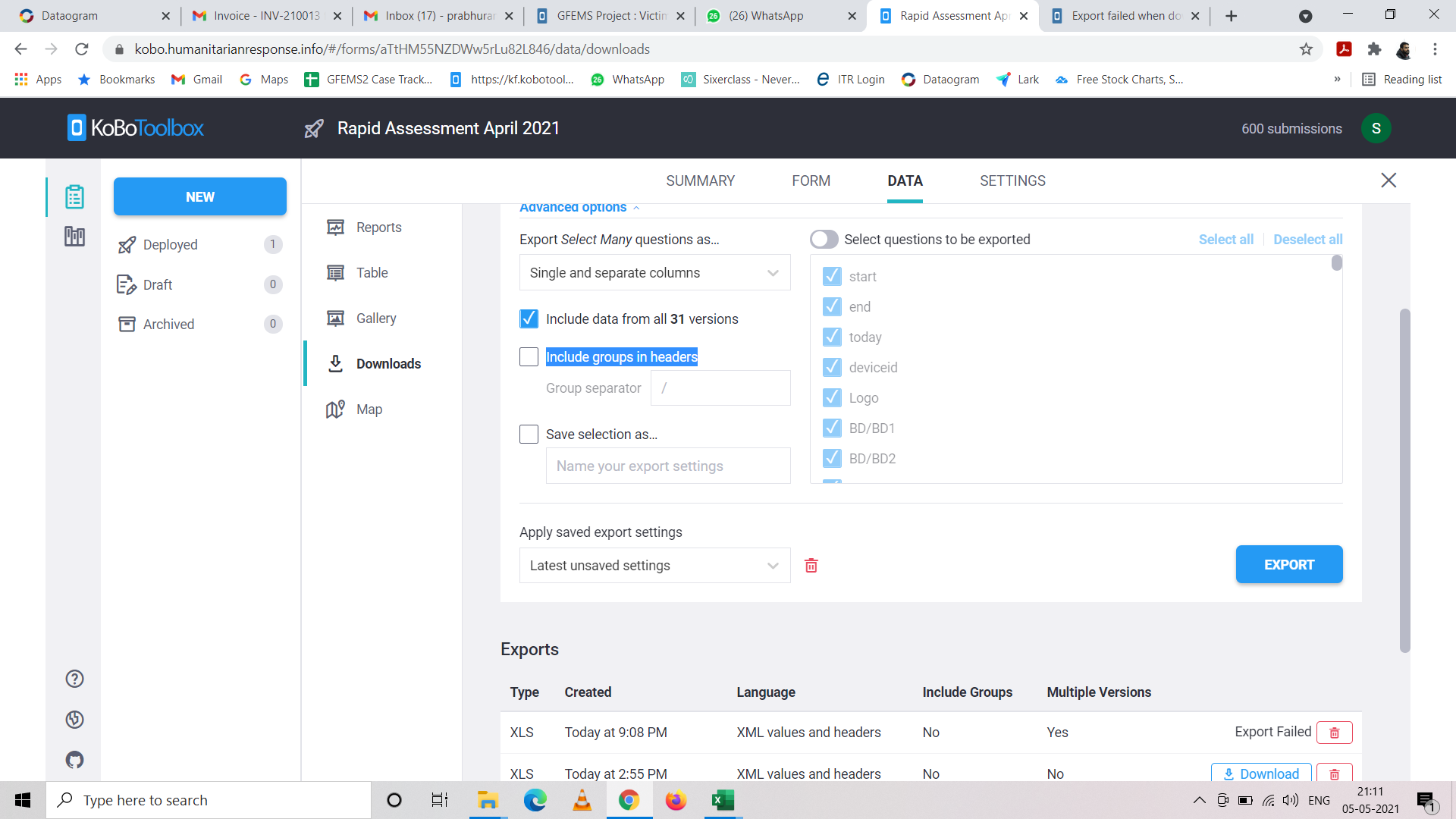NCAA Export Failed: A Comprehensive Guide To Troubleshooting And Solutions
Experiencing an NCAA export failed error can be frustrating for sports enthusiasts and administrators alike. This issue often arises when trying to transfer data from the NCAA database to other platforms. Whether you're dealing with player statistics, team rosters, or other critical data, understanding the root cause of the error and how to resolve it is essential for maintaining smooth operations. In this article, we will delve into the various aspects of this issue and provide actionable solutions.
As the NCAA continues to grow in popularity, the need for efficient data management becomes increasingly important. Exporting data is a fundamental process in managing sports information, and when it fails, it can disrupt workflows and decision-making processes. This guide aims to provide clarity on the causes of the NCAA export failed error and offer practical steps to address it.
Our goal is to help you troubleshoot and resolve this issue effectively. By understanding the underlying causes and following the solutions provided, you can ensure that your data management processes run smoothly and efficiently. Let's dive into the details.
Read also:Jade From Notoriety Unveiling The Rising Star Of Gaming And Content Creation
Table of Contents
- Introduction
- Common Causes of NCAA Export Failed
- Troubleshooting NCAA Export Issues
- Effective Data Management Strategies
- Technical Solutions for Export Errors
- Best Practices for Preventing Export Failures
- Case Studies: Real-World Examples
- Software Options for NCAA Data Management
- Future Trends in NCAA Data Export
- Conclusion
Common Causes of NCAA Export Failed
Understanding the root causes of the NCAA export failed error is the first step toward resolving it. Several factors can contribute to this issue, including technical glitches, incompatible file formats, and improper user permissions. Below are some of the most common causes:
Technical Glitches
Technical issues such as server downtime, network interruptions, or software bugs can lead to export failures. These problems are often beyond the user's control and require intervention from IT support teams. Regular system maintenance and updates can help minimize the occurrence of these glitches.
Incompatible File Formats
Data export failures can occur when the file format being used is incompatible with the receiving system. For example, attempting to export data in a CSV format to a system that only accepts JSON files will result in an error. Ensuring compatibility between systems is crucial for successful data transfers.
Improper User Permissions
Insufficient user permissions can also cause export issues. Users may not have the necessary access rights to certain data sets or functions within the NCAA system. Verifying and adjusting user roles and permissions can help resolve this problem.
Troubleshooting NCAA Export Issues
When faced with an NCAA export failed error, it's essential to follow a systematic approach to troubleshooting. Below are some steps you can take to identify and resolve the issue:
Check System Logs
Reviewing system logs can provide valuable insights into the cause of the error. Logs often contain detailed information about the error, including timestamps and error codes, which can help pinpoint the problem.
Read also:Zubaida Tharwat Jennifer Lawrence A Comprehensive Exploration
Verify File Compatibility
Ensure that the file format being used for the export is compatible with the receiving system. If necessary, convert the file to a different format that is supported by the target system.
Review User Permissions
Double-check user permissions to ensure that the user attempting the export has the necessary access rights. Adjust permissions as needed to grant the required level of access.
Effective Data Management Strategies
Implementing effective data management strategies can help prevent export failures and improve overall data handling processes. Here are some strategies to consider:
Regular Data Backups
Performing regular backups of your data ensures that you have a safety net in case of export failures. Backups can be stored locally or in the cloud, depending on your organization's preferences and requirements.
Data Standardization
Standardizing data formats and structures across systems can reduce the likelihood of export errors. Establishing clear guidelines for data entry and formatting can help maintain consistency and compatibility.
Automated Processes
Implementing automated processes for data export and import can streamline operations and reduce the risk of human error. Automation tools can handle repetitive tasks, freeing up staff to focus on more critical activities.
Technical Solutions for Export Errors
For more complex issues, technical solutions may be required to resolve NCAA export failed errors. Below are some advanced solutions to consider:
API Integration
Integrating APIs between systems can facilitate seamless data transfer and reduce the likelihood of export failures. APIs allow systems to communicate directly, eliminating the need for manual exports and imports.
Middleware Solutions
Middleware software can act as a bridge between incompatible systems, enabling smooth data exchange. These solutions can handle data transformation and formatting, ensuring compatibility between systems.
Custom Scripting
In some cases, custom scripting may be necessary to address specific export issues. Developers can create scripts to automate complex data export processes and handle unique requirements.
Best Practices for Preventing Export Failures
Adopting best practices for data management and system maintenance can help prevent export failures and ensure smooth operations. Here are some best practices to follow:
- Conduct regular system maintenance and updates to address potential issues proactively.
- Train staff on proper data management techniques and the use of export tools.
- Establish clear communication channels between departments to ensure everyone is aware of potential issues and solutions.
- Document all processes and procedures to provide a reference for troubleshooting and training purposes.
Case Studies: Real-World Examples
Examining real-world examples can provide valuable insights into how organizations have successfully resolved NCAA export failed issues. Below are two case studies that highlight effective solutions:
Case Study 1: University X
University X experienced frequent export failures due to incompatible file formats. By implementing a middleware solution, they were able to standardize data formats and eliminate compatibility issues, resulting in a significant reduction in export errors.
Case Study 2: Sports League Y
Sports League Y faced export failures caused by insufficient user permissions. After reviewing and adjusting user roles and permissions, they resolved the issue and improved overall system access management.
Software Options for NCAA Data Management
Several software solutions are available to assist with NCAA data management and export processes. Below are some popular options:
Sporting Software Suite
This comprehensive suite offers tools for managing player statistics, team rosters, and other sports-related data. Its robust export capabilities make it a popular choice for NCAA organizations.
Data Management Platforms
Platforms such as Salesforce and SAP provide advanced data management features, including automated export processes and API integrations. These platforms are highly customizable and can be tailored to meet specific NCAA requirements.
Custom Solutions
For unique needs, custom software solutions can be developed to address specific export challenges. These solutions can be designed to integrate seamlessly with existing systems and processes.
Future Trends in NCAA Data Export
As technology continues to evolve, new trends in NCAA data export are emerging. Below are some trends to watch:
Artificial Intelligence
AI-powered tools are increasingly being used to automate and optimize data export processes. These tools can analyze data patterns and predict potential issues, enabling proactive solutions.
Cloud-Based Solutions
The shift toward cloud-based data management is transforming the way organizations handle exports. Cloud platforms offer enhanced scalability, security, and accessibility, making them an attractive option for NCAA data management.
Blockchain Technology
Blockchain is being explored as a potential solution for secure and transparent data exchange. Its decentralized nature and immutability make it a promising option for addressing export challenges.
Conclusion
In conclusion, the NCAA export failed error can be a significant obstacle for sports organizations, but with the right approach, it can be effectively resolved. By understanding the common causes, following troubleshooting steps, and implementing best practices, you can minimize the occurrence of export failures and ensure smooth data management processes.
We encourage you to take action by reviewing your current data management strategies and implementing the solutions outlined in this guide. Don't forget to leave a comment or share this article with others who may find it helpful. For more information on NCAA data management, explore our other articles and resources.
Michael Scott's Iconic Bandana Character: A Deep Dive
Wood Beam Porch: A Guide To Enhancing Your Home's Exterior Beauty And Durability
DTI Rock N Roll: The Ultimate Guide To Discovering The Rock Scene

Facing "Export Failed" error message while downloading data Data

Export to PDF “The export failed due to an unexpected error” because

Free ncaa championships, Download Free ncaa championships png images